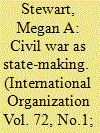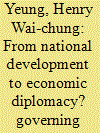| Srl | Item |
| 1 |
ID:
158380


|
|
|
|
|
| Summary/Abstract |
Why do some rebel groups provide governance inclusively while most others do not? Some insurgencies divert critical financial and personnel resources to provide benefits to anyone, including nonsupporters (Karen National Union, Eritrean People's Liberation Front). Other groups offer no services or limit their service provision to only those people who support, or are likely to support, the insurgency. The existing literature examines how insurgencies incentivize recruitment by offering selective social services, yet no research addresses why insurgencies provide goods inclusively. I argue that inclusive provision of services legitimates insurgents’ claim of sovereignty to domestic and international audiences, and thus is a strategic tool secessionist rebels use to achieve their long-term goal of independence. With new and original data, I use a large-N analysis to test this hypothesis. The results of the analysis support the hypothesis, underscoring the importance insurgent nonviolent behavior and addressing key issues such as sovereignty and governance.
|
|
|
|
|
|
|
|
|
|
|
|
|
|
|
|
| 2 |
ID:
108709


|
|
|
|
|
| Publication |
2011.
|
| Summary/Abstract |
This paper examines the changing role and governance of Singapore's two sovereign wealth funds (SWFs) over the past three decades - from their earlier participation in domestic national development to their more active involvement in Singapore's economic diplomacy. Based on a variety of sources and data, I argue that these two SWFs, Temasek Holdings and the Government of Singapore Investment Corporation, are state-sanctioned means to secure the economic future of Singapore; they are not strategic devices developed by the Singapore government to pose geopolitical or economic threats on other states. Over time, their economic functions and strategic orientations have evolved with the city-state's dynamic developmental trajectories in the global economy. In the post-Cold War era of global finance, these state-controlled and professionally managed financial investment vehicles are more visible and active in their global expansion and acquisition trails. There are thus significant challenges to their strategic governance and international legitimacy in this new world order. This paper considers some of these challenges in light of recent development in the two SWFs and assesses their organizational and institutional responses to such challenges in today's competitive global economy. This case study of Singapore's SWFs illustrates the critical importance for understanding the rise of SWFs from small states in the evolving global system.
|
|
|
|
|
|
|
|
|
|
|
|
|
|
|
|